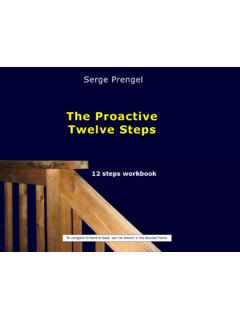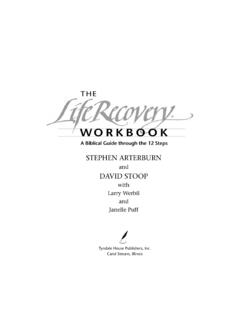Transcription of MAP - Weebly
1 My Action Plan For Relapse Prevention Stinkin' Thinkin' Triggers Medication Adherence Spirituality Circle of Support Problem Solving MAP. Copyright 2002, 03, 04 by Montgomery County Emergency Service, Inc. This publication may be reproduced by photocopy or other means without modifica- tion for free distribution to consumers of mental health and substance abuse ser- vices. Reproduction for any other purpose requires the permission of Montgomery County Emergency Service, Inc. My Action Plan For Relapse Prevention Prepared By: Montgomery County Emergency Service, Inc. 50 Beech Drive Norristown, PA 19403-5421. 610-279-6100 org May 2002. Revised March 2004. Table of Contents What is This Book About? ..6. Spirituality .. 11. Problem Solving .. 17. Medication Adherence .. 22. Circle of Supports .. 27. Stinkin' Thinkin' .. 31. My Action Plan .. 37. Name: _____. Date: _____. Montgomery County Emergency Service, Inc. (MCES) has been providing a broad range of crisis intervention, emergency psychiatric care, and criminal justice diversion services since 1974.
2 MCES has long recognized that many behavioral health crises and emergencies originate with a relapse related to mental illness, substance abuse, or both. Relapse plays a part in many hospital- izations, and many of those served by MCES have a dual diagnosis. In early 2002, a multidisciplinary group of MCES staff got together as a Relapse Prevention Task Force. Their focus was to develop programs to help prevent relapse among MCES consumers. Over several months the group assessed the relapse prevention needs of MCES patients, reviewed the literature on relapse, and evaluated available relapse prevention resources. This publication is the principal output of that process. It is part of an inpatient relapse prevention program that involves patient education, support/therapy groups, individual counseling, and appropriate medi- cation, when necessary. MCES understands that relapse can best be prevented when consumers and providers work to- gether to understand the risks, the signs, the triggers, and the steps to be taken to head off relapse.
3 My Action Plan for Relapse Prevention (MAP) is designed to facilitate this process. MCES welcomes comments on this publication and suggestions for improving future editions. Phone: 610-279-6100. WHAT IS THIS BOOK ABOUT? This book is a tool to help you prevent a relapse. Relapse is defined as a return to a pattern of living that leads to an inability to sustain recovery/ remission. This work- book is designed to encourage you to take an active role in your wellness. The workbook is designed to assist you to rec- ognize early signs of relapse and to independently develop and apply behavioral skills to reduce the risk of relapse. This book will help you recognize relapse as something that can be in your control, not something that suddenly comes out of nowhere. If you seriously work through this book, it can empower you to begin to build a MAP for your emotional, mental and spiritual well being. The book is meant to be used actively when you are discharged. We suggest you review it daily for a week or two and then at regular intervals.
4 The more you review this book and MAP, the better prepared you will be to spot the subtle signs of relapse. 6. Phone: 610-279-6100. TRIGGERS. Sam was very depressed and suicidal after a cocaine binge. He had stopped the medications for his Bipolar illness a few weeks before because he felt so good. He has very little structure in his life, lives in a boarding home and is constantly bored and complaining of not having any fun since he stopped doing drugs. When Sam came into the hospital, he was not aware that many triggers led to his depression. After working with his treatment team, he realized that using drugs, not staying on his medication, and not having any interests/activities to fill up his time triggered his feelings of depression and suicide. Everyone has a past that involves situations that were good or bad. Whenever something happens that reminds me of one of these experiences, it triggers memories of that time. I react to the current situation the way I reacted to the original ones.
5 (I may not even be aware of the original event.). Triggers can be internal (self-thoughts or emotions) or external (situations, events or what people do or say). In order to cope with triggers I may abuse substances, have rages, withdraw from others, feel nervous or anxious, feel suspicious, or hear voices. It is important to be able to identify my specific triggers in order to develop coping strategies to avoid relapsing. Some groups of triggers may be: Physical Triggers - things that affect my body. Life Stressors - personal or world events that affect me. Social Triggers situations that evoke negative thoughts/feelings. Emotional Triggers situations or feelings that negatively affect my sense of self. Triggers 7. Phone: 610-279-6100. any of the following triggers I feel apply to me. For any not listed, I will fill in the lines below. Physical Triggers Life Stress Over tiredness Work Illness, the flu Family Loud noise Financial problems Abuse Housing World events Social Triggers Being alone too much Emotional Triggers Holidays Feeling excluded Vacation Guilt Weddings, funerals Dwelling on the past Pay Day Blame Other people's outbursts Symptoms worsening which may lead to Intimacy with another hospitalization Being successful Others being over-critical Music Feelings of abandonment Anniverary dates of losses or trauma Others interfering in my affairs Other triggers in my life are: _____.
6 _____. _____. _____. _____. Triggers 8. Phone: 610-279-6100. Things to avoid in order to prevent being triggered: _____. _____. _____. _____. _____. _____. _____. _____. _____. _____. Ideas for coping with triggers: _____. _____. _____. _____. _____. _____. _____. _____. _____. _____. _____. Triggers 9. Phone: 610-279-6100. Name _____ Date _____. Evaluation of TRIGGERS. 1. This information helped me to understand how this issue affects me.. Strongly Very Much So-So Not Really Not At All 2. The material is presented clearly and is understandable.. Strongly Very Much So-So Not Really Not At All 3. The information gave me concrete ideas that will be helpful to me when I am discharged.. Strongly Very Much So-So Not Really Not At All 4. With 1 being not at all helpful and 10 being extremely helpful, I would rate this chapter in terms of its usefulness to me as: 1 2 3 4 5 6 7 8 9 10. 5. I would change this chapter. No Yes If Yes, how? _____. _____. _____. Triggers 10. Phone: 610-279-6100.
7 SPIRITUALITY. Tom had a serious drinking and drug problem. He had lost his job and was on the verge of divorce. None of this helped his chronic depression and anxiety. Through a friend, Tom began to attend AA meetings, and while not enthusiastic about everything he heard, it was not hard to admit his life was out of control. He de- cided to give the twelve-step program a real try. By talking with other people in recovery, sharing his feelings and doubts, and being willing to work the twelve- steps, Tom began to feel real hope. He came to realize the Higher Power that recovering people looked to for help and support was simply the God of his own understanding. This definition allowed him to look at spirituality in a brand new light. Tom started to experience the value of daily prayer and meditation, and he read spiritual and recovery literature every- day. He found an increasing understanding of himself and a new sense of self- worth that had been lacking before he began to practice his daily spiritual routine.
8 He discovered it wasn't necessary to be perfect, or always right. In other words, he was happier just being himself. This new understanding of his own spirituality helped Tom feel more connected to other people, more connected to his Higher Power, and more connected to his own recovery. Spirituality 11. Phone: 610-279-6100. What Spirituality is. Spirituality includes feeling more connected to one's self, to other people, to our community, and to God, Nature, or Life in general. Spiritual experiences and individual conceptions of spirituality are personal and vary from person to person. True spirituality in action helps us lead better, more fruitful and happier lives. Check any of the following that I feel apply to me. One expression of spirituality is being calmer, more able to handle problems in a way that benefits me. I feel more spiritual when I'm outdoors in nature, like a park, or in the mountains, or by a quiet lake. Spirituality is love for people. A spiritual experience is when I'm with my kids, laughing and helping them grow up.
9 Spirituality and happiness go hand-in-hand. Spirituality is love for one's self. I believe that one can be very spiritual whether they go to church, temple, synagogue , mosque, or not. Spirituality is not so much what one believes, but what one does to better himself and others. Spirituality is kindness. Spirituality includes everybody. I'm not sure about what spirituality is, but my mind is open. Spiritual success includes leading a better and more fruitful life. I would like to be calmer and feel more connected. My spirituality has to include my experience in life and my own hope for the future. For me, spirituality is not always the same as religion. Spirituality is increasing love. I would like to learn more about spiritual ways of life. I like to help other people. Becoming more spiritual does not mean I must be perfect. I know of a group that includes a strong spiritual connection. I would like to find a group for myself that includes a strong spiritual connection.
10 I believe in my own dignity. I'm learning the value of never giving up. When I feel more connected to others, I feel better about myself. I had a strong church (or religious) background as a child. Spirituality is trying to forgive someone who hurt me. I am grateful to be able to keep on trying. Spirituality means a personal relationship with my Higher Power. Faith is trusting the process of recovery. Spirituality Spirituality is a way to nurture my soul and value my uniqueness. Spirituality is finding my true self. Opening my heart and mind to receive help is a spiritual exercise. 12. Phone: 610-279-6100. Action I will take at MCES to increase my feeling of spirituality: Practice positive affirmations Read inspirational books Pray Meditate Go to 12 Step Meetings and share my feelings Telephone my pastor, rabbi, imam, priest, minister, etc. Ask them to visit me Find a place where I can feel at peace each day Develop daily spiritual practices like 15 minutes of prayer/meditation/inspirational reading in the morning and evening - Quiet Time Create something I like in Art Group and give it to another person Share my ideas about spirituality and learn about other's practices Write a letter to someone thanking them for helping me Work on developing a strong humility Remember things I am grateful for Let go of resentment anger - jealousy Practice gratitude and feeling more JOY in my life Practice acceptance of myself, and living life on life's terms Let go of shame self pity - negative self-image Be honest with myself Practice kindness Be patient with myself and others Learn to share my thoughts and feelings more openly in groups Others: _____.






